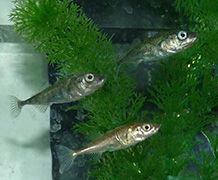Acoustic disturbance has different effects on different species of fish, according to a new study from the Universities of Exeter and Bristol which tested fish anti-predator behaviour.
Three-spined sticklebacks responded sooner to a flying seagull predator model when exposed to additional noise, whereas no effects were observed in European minnows.
Lead author Dr Irene Voellmy of Bristol’s School of Biological Sciences said: “Noise levels in many aquatic environments have increased substantially during the last few decades, often due to increased shipping traffic. Potential impacts of noise on aquatic ecosystems are therefore of growing concern.”
The team, which included Dr Steve Simpson of Biosciences at the University of Exeter, used controlled laboratory experiments to investigate how acoustic disturbance, generated by playbacks of ship noise, changed the anti-predator behaviour of minnows and sticklebacks.
The current study demonstrates species-specific differences in response to noise, potentially driven by a range of underlying behavioural and physiological mechanisms.
Dr Simpson said: “If we want to effectively manage noise in the marine environment, we next need to assess the spatial scale over which individual animals and populations are affected. This means taking experiments like this one to offshore environments near to real-world noise sources.”
‘Increased noise levels have different impacts on the anti-predator behaviour of two sympatric fish species’ by Irene K. Voellmy, Julia Purser, Stephen D. Simpson and Andrew N. Radford is published in the journal PLOS ONE.
*Source: University of Exeter

